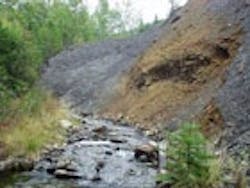Supreme Court Mine-Waste Case May Have Broad Implications
A June 22 Supreme Court decision upheld a federal permit for an Alaska gold mine's waste discharge into an Alaskan lake, E&E News PM reported. The decision may open the door for more dumping into water bodies, according to environmental lawyers.
While George W. Bush was president, the U.S. Environmental Protection Agency (EPA) widened the definition of “fill material” to include some contaminated waste. Under the Clean Water Act, fill can be placed in water for projects such as building levees and seawalls.
The court upheld the permit allowing Coeur d'Alene Mine Co. to dump waste rock from the Kensington gold mine into Lower Slate Lake, referring to ambiguity in regulations for the practice, according to the newsletter.
Earthjustice attorney Tom Waldo warned, "This decision creates an enormous loophole for any kind of pollution waste stream that contains a high level of solids."
The justices pointed out that the lake is a closed water body that would not pollute other waterways. The decision ultimately allows federal agencies to evaluate each permit on a case-by-case basis, the lawyers involved in the case said.
Source: E&E News PM
